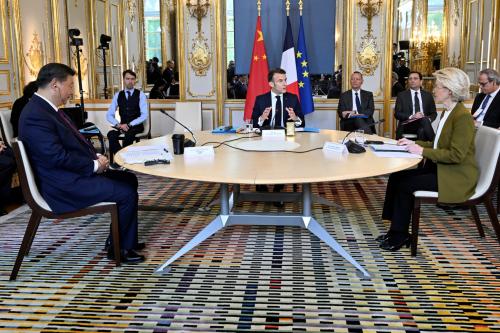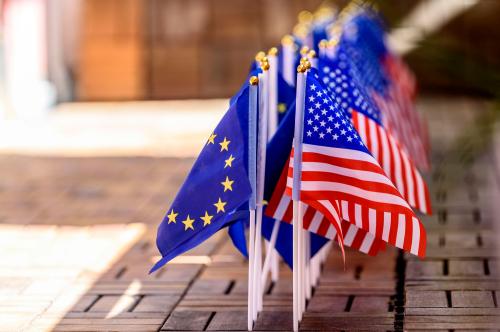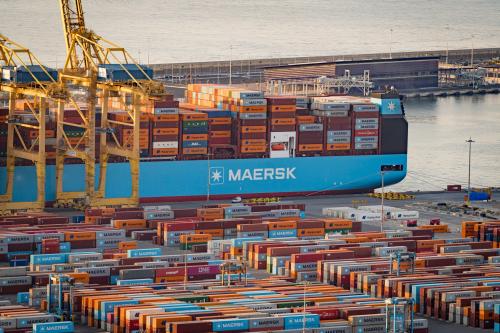Executive summary
After the presidential elections in the United States, the European Union (EU) may seek to use the discussion of common economic security measures against China as a means of preserving or enhancing the trans-Atlantic relationship. But to get there, it will have to overcome current resistance from Germany and other EU member states to the use of coercive economic instruments.
Regardless of who wins the presidential elections, the EU is sure to face American expectations that it will implement economic sanctions against China, including new export controls, investment controls, and tariffs, to safeguard critical technologies and to curb China’s aggressive economic practices. The EU must define its economic security strategy, balancing member states’ interests with the need for a united front against China’s aggressive policies.
Germany’s reluctance to support economic sanctions is fueled by fears of economic retaliation, particularly as its major companies heavily depend on profits earned in China. For any meaningful action against China, the EU must facilitate an honest dialogue that reconciles domestic business interests with broader geopolitical goals and addresses legitimate concerns regarding economic repercussions among companies and their employees. In addition, the EU could explore compensation mechanisms for adversely affected businesses, aiming to mitigate the risks associated with adopting a more assertive economic policy toward China.
Introduction
After the U.S. elections, the European Commission may seek to use the discourse surrounding economic security to enhance or preserve the trans-Atlantic relationship. However, it will need to overcome resistance from Germany and other European Union member states to the use of coercive economic instruments vis-à-vis China.
Ursula von der Leyen’s second term as European Commission president offers a fresh start for trans-Atlantic economic security policy cooperation. Regardless of who wins the U.S. presidential election, the EU is likely to face American expectations that it will implement economic sanctions against China. Broadly defined, the economic sanctions that the next U.S. administration would like its allies to implement could include export controls on critical technologies, controls on certain investments in China, and also financial sanctions to be imposed if China shows signs of moving toward invading Taiwan. In addition, Washington wants the EU to use tariffs to stop certain flows of goods from China, such as electric cars and other vehicles and related parts and software that the Chinese government heavily subsidizes.
Differences between a Harris or Trump administration
Under a Harris administration, it seems more likely that the United States and the EU could build on their previously close cooperation on sanctions against Russia to coordinate on China policy. But working with allies could also be part of Donald Trump’s China policy. There are two main reasons for this: First, most Republican strategists, even in the MAGA camp, agree that sanctions are more effective when implemented by a broader coalition. Second, U.S. business interests are likely to push any administration to ensure that the costs of sanctions are shared. They will not want unilateral U.S. measures to result in European and Asian competitors picking up market share lost by American companies (as occurred when Trump first introduced export controls targeting Huawei).
For the EU to become a sovereign actor in the economic security realm, all its member states must overcome their reluctance to use economic instruments to achieve foreign and security policy goals. They will have to agree on a common definition of economic security and decide which instruments they want to use to fulfill it. To find common ground with Washington, EU member states must decide whether they are willing to use coercive tools against China. Some countries, most notably Germany, remain reluctant to do so.
How the EU could get ahead in trans-Atlantic talks
The United States is about to implement additional export controls on semiconductors, quantum computers, and additive manufacturing and could implement outbound investment controls to limit capital and knowledge transfer to China in certain semiconductors and microelectronics, quantum, and AI systems as soon as this fall. Meanwhile, China is busy preparing for the next U.S. president. Now would be a smart time for the EU to get ahead in the trans-Atlantic bargaining. First, it could seek internal consensus on a clear definition of “economic security,” which remains vaguely defined in the EU strategy published in June 2023. To do so, the EU could draw on its Common Foreign and Security Policy, which includes financial sanctions as an instrument, allows the use of restrictive measures for a wide range of foreign and security policy objectives, and can be targeted at specific governments. Von der Leyen could draw up a list of EU preferences—including limits—on the measures the EU considers necessary to counter China’s actions and protect European economic and security interests. The EU could decide which carrots to request in return for supporting U.S. measures toward China in its first meetings with the next U.S. administration.
Like Joe Biden, the next U.S. president is likely to call for more robust EU action on China. There are at least four policy areas where the United States is pressing the EU to do more:
- Use the newly developed anti-subsidy trade instrument to counter the aggressive entry of Chinese companies into competitive industries in Europe, as the EU recently did for the first time with tariffs on Chinese electric vehicle (EV) imports. Prepare to use the new anti-coercion instrument against China.
- Based on the U.S. export control schedule, take similar—or possibly flanking—EU measures. To this end, the EU could use its own choke points, allowing Europeans to threaten to exclude China from technologies exported by companies in certain member states (e.g., lasers and optical lenses exported by German companies).
- Move beyond screening investments in the EU toward the potential mandatory registration of certain sectoral investments from the EU into China. This would help the EU understand where its potential future outbound investment controls might substantially affect China, and improve the EU’s data on such flows.
- Work toward the development of an EU sanctions roadmap, including significant escalatory steps, should China move toward a military invasion of Taiwan in three to five years. This could include wide-ranging import bans on consumer goods entering the EU single market from an important trade partner like China—as yet unchartered terrain for the EU.
What is keeping the European Commission from going ahead?
While the European Commission has expressed a willingness to take a tougher stance on China, EU member states have wavered. The commission has previously committed itself to pursuing a policy similar to that of the United States and other Western partners to protect critical technologies from Beijing’s military and malign use—including alleged human rights abuses.
After the European Commission decided to unilaterally impose tariffs on electric car imports from China, most EU member states followed its recommendation to counter Chinese car producers that were flooding the European market with EVs, particularly since those producers are receiving massive subsidies that likely violate World Trade Organization rules. In so doing, these states have shown their willingness to overstep concerns from Germany—one of the most important member states—and take common action against China. However, the commission risks a more lasting rift with Berlin—which is worried about Chinese retaliation—and other European capitals if it cannot build consensus on such big decisions.
EU member states’ arguments against using a wider range of coercive economic instruments against China traditionally fall into three categories.
First, politicians argue that the EU is not equipped to pursue a policy of economic sanctions in the same way as the United States. The EU’s current legal structures do not allow for the kind of coherent, whole-of-government approach found in the United States.
Second, European politicians and officials claim that U.S. sanctions policy is based on different ethical norms, arguing that U.S. governments often make unilateral sanctions decisions without seeking multilateral support, such as from the United Nations.
Third, some Europeans claim to have a different understanding of the boundaries between economic and security policy. These voices advise a cautious use of economic coercion, especially in the EU’s relations with China, which they continue to see as an important trading partner with little interest in geopolitical competition with Europe. According to this view, the EU does not need coercive economic measures to protect European interests, let alone a comprehensive economic security strategy.
This level of restraint contrasts with EU member states’ willingness to brush aside doubts about using sanctions and other coercive economic instruments after Russia invaded Ukraine. Since the beginning of the war, EU member states have accepted that the European Commission took control and coordinated policies, which effectively led to an unprecedented policy centralization at the EU level.
However, when it comes to China, many member states are reluctant to follow von der Leyen’s approach. In the current debate in Germany, the primary argument against taking a tougher stance is that there is a high risk of retaliation from Beijing. This points to the fourth and probably most important obstacle to a more robust economic course against China: the strong influence that vested economic interests have had on government decisions about coercive economic measures in Germany, and sometimes in other EU member states as well.
Why is there a “German problem” again?
Germany’s decision to vote against permanent EU tariffs on Chinese EV imports mainly stems from its unwillingness to confront China’s potential retaliation. Germany’s opposition may extend beyond EV tariffs and impact the broader economic security strategy that Washington seeks to establish with the EU regarding China.
A full decoupling from China could incur severe costs for the German economy. Yet, a recent study suggests that losses could mirror those experienced during the global financial crisis and the COVID-19 pandemic—in that they would likely decrease after the first year and would be manageable overall. The largest German car and chemical companies’ production in Germany may be less affected by Chinese retaliation, should it take the form of direct import tariffs. This is because they have already shifted much of what they produce for the Chinese and wider Asian markets to China. However, these companies are more dependent on profits made in China than smaller companies in Germany and other EU member states. This makes them more likely to oppose any EU measure that might sour their relationship with the Chinese government. At the same time, the German “Mittelstand”—Germany’s small and medium-sized enterprises (SMEs), which face increasing pressure from Chinese competitors—would benefit from a tougher EU approach. These firms are already under pressure and losing market share, which could lead to future layoffs, a decline in innovation, and a weakening of Germany’s traditionally strong manufacturing sector. Yet, their concerns about unfair competition seem to be less important in Germany’s domestic debate than large companies’ fears of losing profits.
How to solve it
Not for the first time, German companies’ investment ties are leading Berlin to resist the European Commission’s efforts to change its relationship with a significant external actor. To change this dynamic and win the German government’s support for a common economic security strategy, two things are needed.
First, the German government should honestly debate and recalibrate its China-related economic policies in consideration of SME’s concerns and competitive pressures, the interests of large and highly exposed German companies, and the public’s security concerns.
Second, to help political leaders in Germany and other member states that are increasingly targeted by Chinese retaliation, the European Commission should present a strategy on how to meaningfully compensate for losses related to economic battles with China. To achieve this, the EU will need to devise a workable compensation mechanism for companies most affected by adverse economic shocks. To be credible, it will have to make concrete offers, including financial compensation, to sectors and companies—and, importantly, workers—that will suffer economic losses. Such a mechanism, however, will have to be accompanied by a clear communication that the EU will not compensate losses resulting from extreme and imprudent investments by European companies in China.
Conclusion
In conclusion, the EU’s potential adoption of economic sanctions against China hinges on overcoming significant internal resistance, particularly from Germany, which fears retaliation and the economic fallout of a tougher stance. Under von der Leyen, the European Commission aims to enhance trans-Atlantic cooperation on economic security. Yet, achieving a unified approach requires member states to reconcile their differing views on coercive measures.
To attain a strategic consensus on defining economic security, the European Commission will have to engage with reluctant member state governments and take their domestic concerns seriously. The commission could also talk with member state governments about what it would take to bring a larger part of the business sector and the public on board with a common European strategic approach vis-à-vis China. Part of the solution could be a robust compensation mechanism for affected businesses to address concerns about economic repercussions. Ultimately, the EU’s ability to navigate these complexities will determine its alignment with U.S. policies toward China and its role as a sovereign actor in the global economic landscape.
The Brookings Institution is committed to quality, independence, and impact.
We are supported by a diverse array of funders. In line with our values and policies, each Brookings publication represents the sole views of its author(s).







